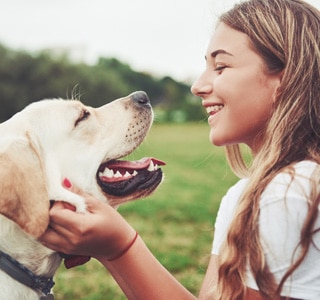- text
-
† Offer available to new Everyday Pet Insurance policyholders, and is limited to 1 membership per eligible policy. The free membership offer (valued at $199p.a) is from the date of your policy commencement, provided your Everyday Pet Insurance policy remains active. You are not eligible to redeem the free membership subscription for cash or credit. VetAssist is a separate subscription based service to the Everyday Pet Insurance product, and is provided independently by Everyday Insurance third party service provider, VetChat Services Pty Ltd (VetChat). Click here for full VetAssist Service terms and conditions. Everyday Insurance reserves the right to vary or remove this offer at any time and will provide reasonable notice of any such changes.
Diet guide for senior dogs and cats.
Our pets rely on us to provide their entire diet, so it’s essential that it’s complete and appropriate to their stage of growth. By that, we mean a growing kitty or pup will have largely different requirements compared to when they are senior pets.
Your senior pet needs a suitable diet that takes into account their unique nutritional needs as they age. Consultation with your veterinarian is essential to address any specific health concerns and tailor a diet plan that supports your pet's well-being.
Understanding Senior Pet Nutrition:
As our pets age, their nutritional requirements evolve to accommodate changes in metabolism, activity levels, and overall health. Crafting a diet tailored to meet these needs is crucial for maintaining your senior pet's vitality and quality of life. Here's what you need to know:
Protein Needs: Contrary to popular belief, senior dogs require good levels of protein to support muscle maintenance and overall health. Look for protein content derived from quality meat sources to support your pet's aging muscles. A protein-restricted diet might be needed to support pets with moderate or severe kidney or liver disease.
Sodium: Sodium restriction may be unnecessary for most older dogs and cats. However, for certain health conditions such as heart disease, it’s advisable to restrict the salt level of the diet.
Fibre Balance: Fibre plays a crucial role in maintaining digestive health and regular bowel movements in senior pets. However, high fibre foods may not be appropriate for animals with trouble maintaining weight since they are generally lower in energy.
Energy Intake: As your pet's activity levels decrease with age, their energy requirements also decline. If your pet gains weight, it’s wise to choose senior pet foods that are less energy-dense to prevent excess weight gain and support optimal body condition. Portion control is key to managing your senior pet's weight effectively.
Omega-3 fatty acids: These have anti-inflammatory properties that can benefit senior pets with conditions like arthritis. Consider incorporating fish oil supplements into your pet's diet to support joint health. If a good quality, complete and balanced food is being fed, supplementation may be unnecessary.
Should All Older Pets Eat Senior Pet Food?
While senior pet foods are formulated to meet the unique needs of aging pets, there's no one-size-fits-all approach to their nutrition.
When choosing the best diet for a senior pet, the primary consideration should be their overall health. If they are in good health, they are maintaining a healthy body condition, and consuming high-quality adult food, there's no need to switch to a different diet.
Consultation with your veterinarian is essential for developing a personalised nutrition plan that supports your senior pet's health and well-being.
Related articles.
- text
-
Everyday Pet Insurance policies entered into for the first time prior to 17 July 2023 and subsequent renewals of those policies are issued by The Hollard Insurance Company Pty Ltd ABN 78 090 584 473, AFSL 241436 (Hollard), arranged and administered by PetSure (Australia) Pty Ltd ABN 95 075 949 923, AFSL 420183 (PetSure) and promoted and distributed by Hollard’s Authorised Representative (AR) Woolworths Group Limited ABN 88 000 014 675, AR 245476 (Woolworths). Everyday Pet Insurance policies entered into for the first time on or after 17 July 2023 and subsequent renewals of those policies are issued by PetSure and promoted and distributed by PetSure’s AR, Woolworths. Any advice provided is general only and does not take into account your individual objectives, financial situation or needs. Please consider the Product Disclosure Statement (PDS) to ensure this product meets your needs before purchasing, or choosing to continue with the product. PDS and Target Market Determination available at insurance.everyday.com.au/pet-insurance.





